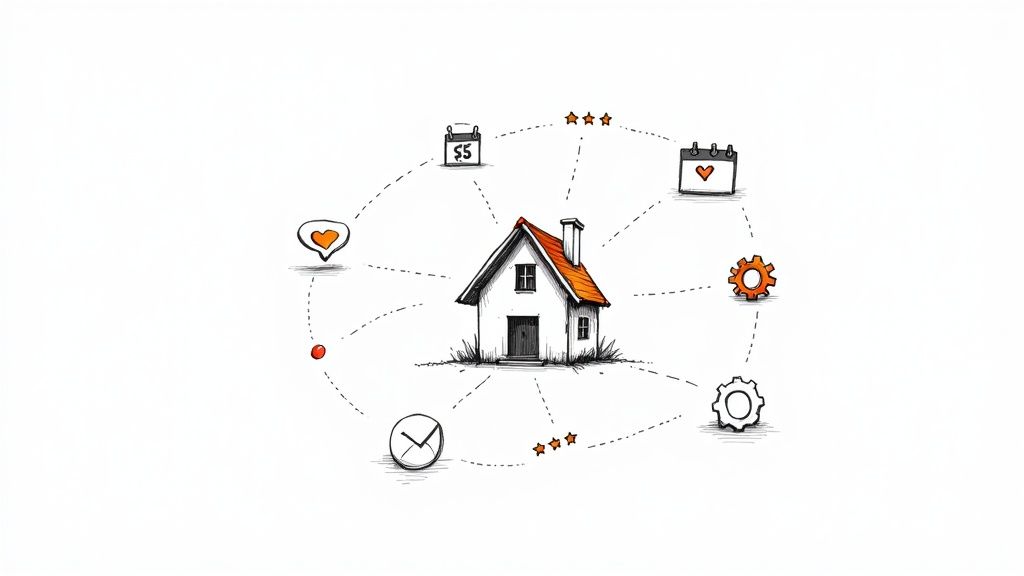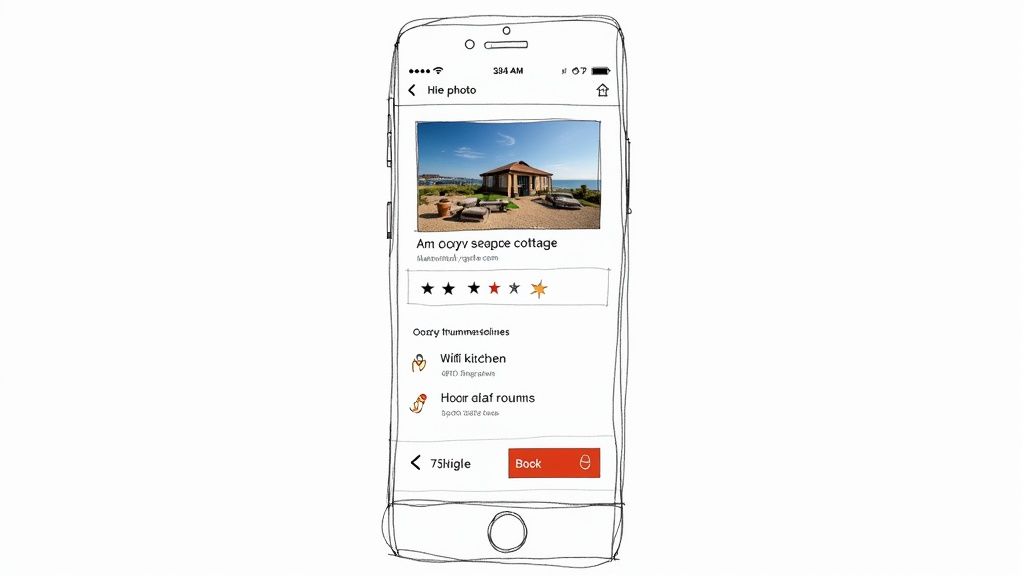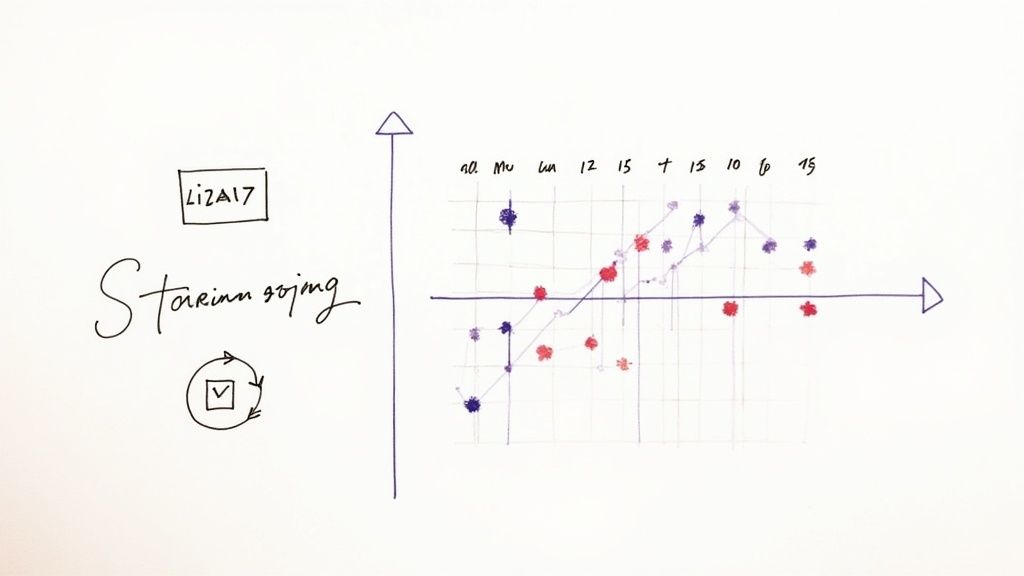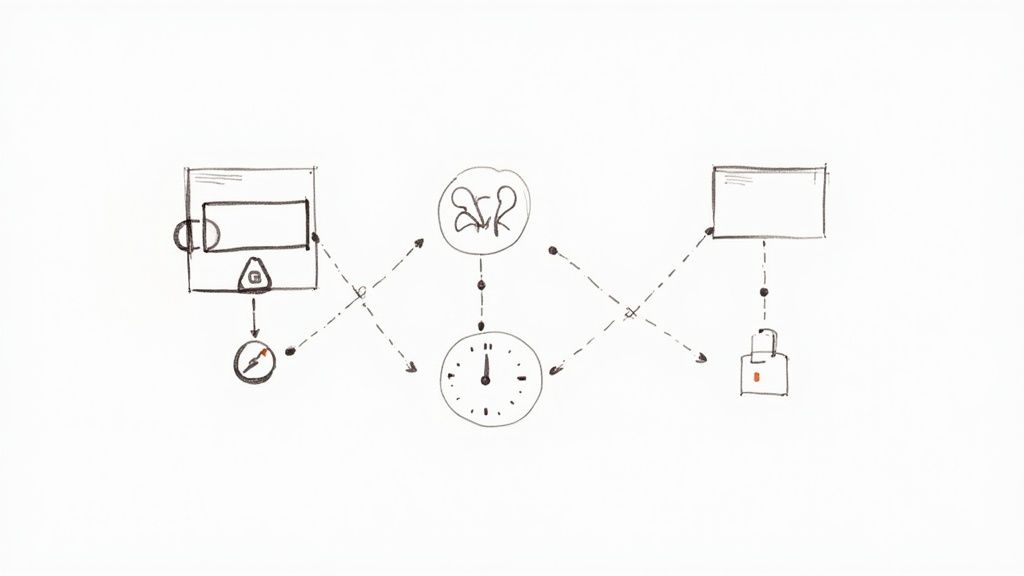
get more bookings
How Do I Get More Bookings for My Short Term Rentals?
Posted on Oct 31, 2025

Before you even think about marketing, the first step to getting more bookings is nailing your online listing. This is your digital storefront, and it needs to be optimized to turn casual browsers into confirmed guests. We're talking professional photography, irresistible headlines, and descriptions that sell an experience, not just a room.
A powerful first impression is what separates a listing that gets skipped from one that gets booked.
Crafting a Listing That Converts Browsers into Bookers

Think of your online listing as your property's handshake, resume, and sales pitch all rolled into one. In a sea of options, potential guests spend mere seconds on a listing before deciding to either click away or dig deeper. A weak first impression means you've already lost.
The goal isn't just to show your property; it's to make it the obvious choice. This means you need to sell an experience—a relaxing weekend getaway, a productive work-from-anywhere retreat, or a fun-filled family adventure.
The Power of Professional Photography
Let's be blunt: your photos are the single most important part of your listing. Grainy, poorly lit smartphone pictures just scream "amateur" and can kill a guest's interest on the spot. Professional photography isn't a luxury; it's a non-negotiable investment for your rental business.
A pro knows how to use light, angles, and staging to make your space look its absolute best. They capture the vibe and highlight the unique features that make your property special, helping guests truly picture themselves there. This one investment can pay for itself with just a couple of extra bookings.
A study of over 100,000 listings found that properties with professional photos earn 40% more revenue, get 24% more bookings, and can charge a 26% higher nightly rate.
Seeing your listing as a conversion tool is key. To really get into this mindset, it's helpful to understand fundamental conversion rate optimization strategies. This approach shifts your focus from just describing your space to actively persuading potential guests.
Writing Headlines and Descriptions That Sell
Once your amazing photos grab their attention, your words have to seal the deal. Your headline is your hook—it needs to be punchy, captivating, and packed with value. Ditch the generic "2BR Condo Downtown" for something that tells a story, like "Modern 2BR Loft w/ Rooftop Deck | Walk to Cafes."
Your description should pick up where the headline leaves off, painting a vivid picture of the guest experience. The trick is to focus on the benefits, not just the features.
- Feature: "Fast Wi-Fi" → Benefit: "Blazing-fast Wi-Fi for seamless remote work and streaming your favorite shows."
- Feature: "King-sized bed" → Benefit: "Sink into a luxurious king-sized bed for a truly restful night's sleep."
- Feature: "Fully-equipped kitchen" → Benefit: "Whip up memorable meals in a fully-equipped gourmet kitchen."
Remember, the competition is fierce. The short-term rental industry added 9% more listings globally last year, and Airbnb alone has over 7.7 million active listings. In this environment, your listing is your greatest weapon.
To get your listing elements just right, it helps to break them down and understand how each one influences a potential guest's decision.
Listing Elements and Their Impact on Bookings
This table shows you exactly which parts of your listing matter most and gives you a quick tip for each one.
| Listing Element | Why It Matters for Bookings | Actionable Tip |
|---|---|---|
| Headline | It's the first thing guests read. It needs to be compelling enough to make them click. | Include the top 2-3 selling points, like "Ocean View" or "Hot Tub." |
| Photos | Guests "shop" with their eyes. High-quality images build trust and desire. | Hire a professional photographer who specializes in real estate. It's worth it. |
| Description | This is where you sell the experience. It helps guests imagine their stay. | Use storytelling. Describe a perfect day at your property, from morning coffee to evening cocktails. |
| Amenities List | Guests often filter by amenities. A detailed list gets you seen by the right people. | Be exhaustive. List everything, even small things like a blender or board games. |
| Reviews | Social proof is everything. Positive reviews build immense trust and confidence. | Actively request reviews from happy guests shortly after their stay. |
By optimizing each of these elements, you create a powerful, cohesive message that reassures guests they're making the right choice.
Building Confidence with Comprehensive Details
The final piece of the puzzle is building trust through transparency. An exhaustive, clearly presented amenities list removes any guesswork and makes guests feel confident they're booking the right place.
Don't make them wonder if you have a coffee maker—tell them you have a Nespresso machine with complimentary pods. Mention the beach towels, the high-speed blender, the smart TV. This level of detail shows you're a professional host who has thought of everything.
For more inspiration, check out our guide on the must-have features for a high-converting short-term rental website; many of the same principles apply to your OTA listings. When you combine stunning visuals, persuasive copy, and thorough details, you create a listing that doesn't just inform—it converts.
Get Smart with Dynamic Pricing and Availability

Let's be blunt: your pricing is more than just a number. It's one of the most powerful levers you can pull to get more bookings. If you're still using a single, set-it-and-forget-it rate all year, you're essentially flying blind and leaving a pile of money on the table.
The secret to boosting both your occupancy and your revenue is a dynamic pricing strategy. This just means your rates should be fluid, constantly adjusting to what's happening in the real world—market demand, seasonality, local events, and what your competitors are up to. It’s how you avoid being overpriced in the slow season or, even worse, underpriced when demand is through the roof. Nailing this is fundamental to getting more bookings.
Get to Know Your Market's Rhythm
First things first, you have to stop thinking about your property in a bubble. It exists in a living, breathing market with predictable highs and lows. Your job is to become an expert on what makes your local area tick.
Pull up a calendar and start mapping out the year. Pinpoint the obvious peak and off-seasons, but then you need to dig deeper.
- Local Events: Is there an annual music festival? A major conference? A big college graduation weekend? These events are goldmines, creating massive spikes in demand that absolutely justify a higher price.
- Holidays: Don't just think Christmas and Fourth of July. Three-day weekends are prime booking opportunities where a little rate bump is totally expected.
- Seasonal Appeal: Got a cozy mountain cabin? Your winter weekends are peak season. A breezy beach house? Summer is your time to shine. Price accordingly.
This kind of market awareness is more important than ever. While U.S. short-term rentals have recently done better than hotels, forward-looking occupancy for the upcoming season is actually down 11%. That tells us hosts need to be nimbler than ever to snag those last-minute bookings in a market where people are booking with shorter lead times. Staying on top of trends like these is what separates the pros from the amateurs.
Your Pricing Toolkit: Manual vs. Automated
Once you have a feel for your market's pulse, you need to decide how you'll actually make these price changes. You've really got two options: adjusting everything by hand or using an automated pricing tool.
A manual approach puts you in the driver's seat. You're in complete control, setting every price for every night based on your own research. This can work if you only have one or two properties and genuinely enjoy digging into spreadsheets. But let's be honest—it's incredibly time-consuming and easy to mess up. You could easily miss a sudden surge in demand or forget to update your rates for a newly announced concert.
This is where automated dynamic pricing tools like PriceLabs or Wheelhouse come in. These platforms plug right into your listing calendar and do all the heavy lifting. They crunch billions of data points—competitor rates, hotel prices, local demand signals, and historical trends—to automatically recommend and set the perfect price for every single night. For most hosts, especially anyone juggling multiple properties, automation is a no-brainer for its efficiency and data-driven precision.
Key Takeaway: The goal of dynamic pricing isn't just to crank up prices during high season. It's about finding that sweet spot for every single night to maximize what you earn over the entire year.
Smart Calendar Settings That Drive Bookings
Pricing is just one side of the coin; your availability settings are the other. The way you manage your calendar can have a huge impact on your visibility and booking potential. Smart hosts play with these settings to fill awkward gaps and appeal to a broader range of guests.
Try putting these strategies into practice:
- Adjust Your Minimum Stays: A strict 7-night minimum might be perfect for July, but it's a recipe for an empty calendar in October. During your slow season, drop your minimum stay to attract travelers looking for a quick weekend getaway.
- Offer Gap Day Discounts: Got a weird one or two-night gap stranded between longer bookings? It’s a tough sell at the standard rate. Many automated tools can apply an automatic "gap day" discount to make these nights irresistible.
- Use Last-Minute and Early-Bird Promos: Offer a 10-15% discount for guests booking within a few days of arrival to fill those final empty nights. On the flip side, you can offer a small discount for guests who book months ahead to lock in some guaranteed income.
These aren't huge changes, but they can make a world of difference. For a deeper look at these tactics, check out our complete guide to vacation rental revenue management. When you pair an intelligent pricing strategy with flexible availability, you create a powerful system that keeps your calendar full and your bank account happy.
Expanding Your Reach Beyond a Single Platform
Relying solely on one booking platform like Airbnb or Vrbo is like fishing in a small pond when there’s a massive ocean of potential guests just out of reach. It might feel simpler to manage just one listing, but you're leaving money on the table and making your business surprisingly fragile.
To really get more bookings for your short-term rental, you need to cast a much wider net. This is where a multi-channel distribution strategy comes in. By listing your property across several different platforms, you put it in front of entirely new audiences who would have never found you otherwise.
Why You Need to List on Multiple Channels
Think about the different kinds of travelers out there. A family planning a week-long beach trip often heads straight to Vrbo, while a younger couple looking for a cool, urban loft for the weekend might only browse Airbnb. And for international or business travelers? They frequently rely on Booking.com for its hotel-like, instant-confirmation experience.
When you're present on all of them, you multiply your visibility overnight. Each platform is its own marketing powerhouse with a fiercely loyal user base. Instead of trying to pull every traveler to one spot, you simply meet them where they’re already looking.
This diversification is also a critical safety net for your business. Imagine an algorithm change on your single platform suddenly buries your listing on page ten. Or a new policy unexpectedly impacts your operations. If you're diversified, your entire income stream isn't in jeopardy because you have other channels consistently bringing in reservations. It just makes for a more resilient, stable business.
Choosing the Right Mix of Platforms
Getting your property out there is the goal, but you want to be strategic about it. For almost any rental, starting with the "big three" is a no-brainer because of their sheer volume of traffic and global reach.
- Airbnb: Famous for its incredibly diverse inventory, from quirky tiny homes to sprawling luxury villas. It tends to attract a broad demographic, including younger travelers and anyone hunting for a unique, one-of-a-kind stay.
- Vrbo: Traditionally caters to families and larger groups searching for entire homes for longer vacations. It's a dominant force in classic vacation destinations.
- Booking.com: A global giant with a huge international audience. Its signature "instant book" feature is a massive draw for travelers who want a quick, seamless confirmation process, much like booking a hotel.
Once you've covered the basics, look into niche platforms that align perfectly with your property. If you own a high-end cabin, listing on a site that focuses on luxury or outdoor travel could be a goldmine. Have a pet-friendly cottage? A platform dedicated to travelers with pets will connect you with a super-specific and appreciative audience.
The key is to understand the typical guest profile for each channel and match it to what makes your property great. Don't just list everywhere for the sake of it; list where your ideal guest is already searching.
To help you decide where to focus your efforts, here’s a quick breakdown of the top players:
Top Booking Channel Comparison
Choosing where to list your property can feel overwhelming, but understanding the nuances of each major platform makes the decision much easier. Each channel attracts a slightly different audience and operates with a different fee structure. This table compares the "big three" to give you a clearer picture of where your property might fit best.
| Platform | Best For | Typical Guest Profile | Commission Fee Structure |
|---|---|---|---|
| Airbnb | Unique stays, urban apartments, and experience-focused travel. | Younger travelers, couples, solo adventurers, and digital nomads seeking authentic experiences. | Split-fee (host and guest) or host-only fee (3-15%). |
| Vrbo | Entire homes, family vacations, and group getaways in traditional destinations. | Families, larger groups, and vacationers looking for longer stays with home-like amenities. | Per-booking fee (5%+) or annual subscription ($499/year). |
| Booking.com | Properties wanting maximum global visibility and instant bookings. | International travelers, business travelers, and guests who prefer a straightforward, hotel-style booking process. | Host-only commission (around 15%), depending on location. |
Ultimately, the best strategy often involves a mix of these platforms. Starting with the one that most closely matches your ideal guest is a great first step, but expanding to others will maximize your reach and protect your income.
The Ultimate Goal: Your Own Direct Booking Website
While OTAs (Online Travel Agencies) are crucial for getting eyes on your property, the most profitable booking you'll ever get is a direct one. Creating your own direct booking website is a game-changing move that puts you in the driver's seat.
With a direct site, you own the entire guest relationship from the first click to the final review. You're not just another listing in a sea of competitors; you're building a brand. This is how you cultivate a base of loyal, repeat guests who book with you time and time again.
Best of all, you eliminate commission fees, which can eat up 15% or more of your revenue. Over the course of a year, that adds up to a serious amount of cash that goes straight into your pocket. Research shows that nearly one in three guests now book their stays directly with hosts, bypassing the major platforms completely. If you don't have a direct booking option, you're leaving a huge slice of the market on the table.
Taming the Chaos with a Channel Manager
Of course, the biggest fear for hosts considering multi-channel distribution is the dreaded double booking. Trying to manage multiple calendars by hand is a recipe for disaster. It’s stressful, incredibly time-consuming, and almost guarantees you'll make a costly mistake.
This is where a channel manager becomes your most essential tool. Think of it as the central nervous system for your business. This software automatically syncs your calendars, rates, and availability across all your platforms in real-time.
When a guest books your place on Airbnb, the channel manager instantly blocks off those dates on Vrbo, Booking.com, and your own direct booking site. It transforms a complex, manual process into something seamless and automated, freeing you up to focus on what matters most: your guests.
By expanding beyond a single platform and strategically building your own direct channel, you shift from being just another host to being a savvy business owner. You protect your income, reach exponentially more guests, and build a sustainable brand that doesn't depend on any single company.
Engineering an Unforgettable Five Star Guest Experience

A stunning listing and savvy pricing might get guests through the door, but it's the experience you deliver that turns them into your most powerful marketing asset. In the world of short-term rentals, glowing five-star reviews are the ultimate social proof. They build trust, rocket your listing up the search rankings, and often provide the final nudge a potential guest needs to click "Book Now."
Getting to that level of satisfaction isn't about grand, expensive gestures. It's about engineering a thoughtful, seamless, and memorable stay from the moment they book until long after they’ve checked out. This proactive approach shows you're a caring, professional host, which is a massive factor in how guests decide where to stay.
Perfecting the Arrival Experience
The first few moments of a guest's stay set the tone for their entire trip. A clunky, confusing, or impersonal arrival can create a sense of unease that’s tough to shake off. Your goal is to make checking in feel effortless, welcoming, and reassuring.
A few days before they show up, send a clear, concise message with everything they need: the exact address, simple check-in instructions (with pictures, if possible!), the Wi-Fi password, and your contact info. This simple act of proactive communication shows you’re on top of your game.
But don't stop there. The real magic happens when they first walk through the door.
- A Personalized Welcome: A simple, handwritten note addressed to the guest by name is an incredibly powerful touch. It takes less than a minute but makes the experience feel personal, not transactional.
- A Thoughtful Welcome Basket: You don't need to spend a fortune. A basket with a few bottles of water, some local snacks like craft potato chips or chocolates, and maybe a local beer or coffee sample shows incredible thoughtfulness.
- Create the Right Ambiance: If you can, leave a few lights on for evening arrivals so they aren't fumbling in the dark. Setting the thermostat to a comfortable temperature is another small detail that makes a huge difference.
These touches transform the arrival from a simple transaction into a warm welcome, immediately making guests feel cared for and right at home.
The Power of an Insider's Guide
One of the best ways to elevate a guest's stay is to give them the keys to the city—your city. While anyone can find tourist traps online, they booked your rental for an authentic, local experience. A curated digital guidebook is the perfect tool to deliver just that.
Go beyond just listing addresses. Share your personal favorites and explain why you love them.
Pro Tip: Structure your digital guide like a local friend would. Create categories like "My Favorite Morning Coffee Spot," "The Best Hidden Gem for Tacos," "A Perfect Rainy Day Itinerary," or "Where to Go for a Scenic Sunset Walk." This insider knowledge is something a hotel could never offer.
This guide not only provides immense value but also subtly reinforces your status as a knowledgeable and helpful host. It helps guests create amazing memories, which is exactly what they'll remember when it's time to leave that all-important review.
Proactive Communication and Graceful Problem Solving
Excellent communication doesn't mean bombarding your guests with messages. It means being available, responsive, and one step ahead of their needs. A quick check-in message the morning after they arrive just to make sure everything is perfect goes a long, long way.
Of course, even with the best planning, things go wrong. A Wi-Fi outage, a tricky appliance, or a plumbing issue can happen. How you handle these situations is what separates an average host from a five-star one.
When an issue pops up, respond with speed, empathy, and a clear plan of action. Acknowledge their frustration, apologize sincerely, and let them know exactly how and when you're going to fix it. A guest who sees you handle a problem with grace and professionalism is often more likely to leave a glowing review than one who never had an issue at all.
Finally, at the end of their stay, send a thank-you message and gently prompt them for a review. Remind them how much their feedback means to you. By engineering a fantastic experience from start to finish, you make leaving five stars feel like the natural and obvious thing to do.
Work Smarter, Not Harder With Automation

As bookings pile up, managing your rental can go from a side hustle to a full-time grind in a hurry. You find yourself buried in repetitive tasks—answering the same questions, coordinating check-ins, and sending reminders.
This is exactly where automation steps in. Think of it as your most reliable employee: it works 24/7, never forgets a task, and helps you deliver a flawless guest experience every single time. By automating the routine stuff, you free yourself up to focus on what really moves the needle, like marketing or improving your property.
Key Automation Tools for Modern Hosts
To really work smarter, you need the right tools in your corner. Smart tech isn't just a gimmick anymore; it's a core part of running a competitive rental. These tools don't just save time—they protect your property and seriously upgrade the guest experience.
Here are a few essentials that successful hosts swear by:
- Smart Locks: Forget fumbling with lockboxes or coordinating key handoffs. Smart locks let guests check themselves in anytime with a unique code that’s only active for their stay. It’s secure, convenient, and feels incredibly professional.
- Noise Monitors: Worried about parties? These discreet devices monitor decibel levels and send you an alert if things get too loud. You can step in before it becomes a problem for your neighbors.
- Automated Messaging: This is probably the single biggest time-saver. A smart messaging flow sends guests the right info at the right time, so you're not constantly glued to your phone.
Designing the Perfect Automated Guest Messaging Flow
Your messaging flow is your secret weapon for proactive, professional communication. You can set up automated messages to trigger at key moments, making guests feel like you’re always one step ahead of their needs.
Here's a simple, effective sequence I've seen work wonders:
- Booking Confirmation: The moment they book, an instant message goes out. It thanks them and confirms all the key details. Simple, but reassuring.
- Pre-Arrival Info: Three days before check-in, they get everything they need: the address, check-in instructions, their unique door code, and a link to your digital guidebook.
- First-Day Check-In: Send a quick note the morning after they arrive. "Hey, hope you settled in well! Is there anything you need?" This little touch goes a long way.
- Check-Out Reminder: The evening before departure, a gentle reminder about the check-out time and any simple instructions (like where to leave the trash) is super helpful.
- Review Request: A day after they've left, a final message thanks them again and politely asks for a review. Timing is everything here.
This level of consistent, timely communication is what separates good hosts from great ones. It creates a feeling of professionalism and care that guests consistently mention in five-star reviews.
In a market where the average occupancy rate for U.S. listings is just 56.2%, this kind of responsiveness can make all the difference. As competition heats up, quick, reliable communication becomes a huge factor in why guests choose—and rebook—your property. Check out the latest vacation rental statistics to see just how critical these details are.
Automation isn’t just about clawing back your time; it’s about building a better, more scalable business. When you systemize your operations, you deliver a consistently fantastic experience that fuels the five-star reviews you need to climb the search rankings. For an even deeper dive, explore our guide on how to use AI to automate your short-term rental business.
Got Questions? We’ve Got Answers.
When you’re trying to ramp up your bookings, you’re bound to run into some tricky situations. Even the most seasoned hosts hit roadblocks now and then.
Let's dive into some of the most common questions we hear from hosts. Think of this as your personal cheat sheet for navigating those challenges and keeping your calendar packed.
What’s the Best Way to Handle a Negative Review?
Getting a bad review can feel like a personal attack, but how you respond is what really counts for potential guests. The absolute worst thing you can do is ignore it. A thoughtful, public reply shows you’re a pro who listens to feedback.
First, take a breath. Then, thank the guest for sharing their thoughts, even if it stings. Address their specific points calmly without getting defensive. If you dropped the ball, own it. Briefly explain what you’ve done to fix the problem for the next guest.
For instance, if someone complained about a slow drain, your reply could look something like this: "Hi [Guest Name], thanks for the feedback. We were so sorry to hear about the shower drain and had a plumber out to fix it right away. We appreciate you letting us know so we can make sure every stay is perfect." See what that does? It spins a negative into a positive, showing you're on top of things.
Which Property Upgrades Actually Make a Difference?
It’s easy to get caught up in the idea of a massive renovation, but big spending doesn't always equal more bookings. You want to zero in on the upgrades that seriously boost the guest experience and pop in your listing photos.
From what we've seen, these investments consistently deliver the best bang for your buck:
- Dreamy Bedding: A truly comfortable bed is something guests remember and mention in reviews. Invest in a top-notch mattress, high-quality linens, and a few different pillow options.
- An Awesome Outdoor Space: A fire pit, a cozy seating area, a hot tub, or even just some stylish string lights can turn a boring patio into a guest-favorite hangout spot.
- Blazing-Fast Wi-Fi: Let's be honest, this isn't an amenity anymore—it's a necessity. Fast, reliable internet is a dealbreaker for remote workers and families, and it's one of the first things people filter for.
- Keyless Entry: A smart lock is a simple touch that makes a huge difference. It makes check-in a breeze, boosts security, and gives your property a modern, convenient feel that guests love.
Remember, the name of the game is investing in features guests are actively looking for. Focus on comfort, convenience, and creating those picture-perfect moments they can't wait to share.
How Can I Market My Rental When It’s the Off-Season?
The slow season doesn't have to mean a ghost town on your booking calendar. A little creative strategy can attract a whole new type of traveler. Sure, you'll need to adjust your pricing, but don't just race to the bottom.
Instead, create packages that offer real value. If you have a mountain cabin in the spring, why not market a "Hiker's Retreat" package? Include some local trail maps, complimentary energy bars, and a guide to the best post-hike breweries. For a beach house in the fall, you could create a "Cozy Coastal Escape" with a bottle of wine, a stack of board games, and your personal recommendations for the best cafes to watch a storm roll in.
Push these unique offers on social media and in emails to your past guest list. Play up the perks of the off-season—fewer crowds, stunning scenery, and a more laid-back vibe. It’s all about tapping into a different traveler mindset to keep those bookings coming in year-round.
Ready to stop leaving money on the table and start driving more direct bookings? hostAI gives you the advanced AI tools you need to build a powerful online presence, automate your marketing, and take control of your revenue. Discover how hostAI can transform your business.